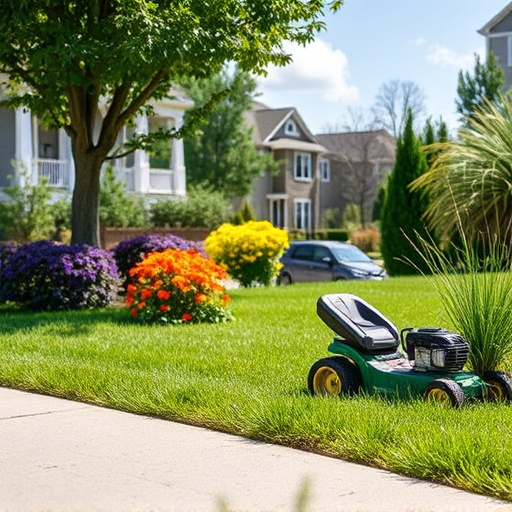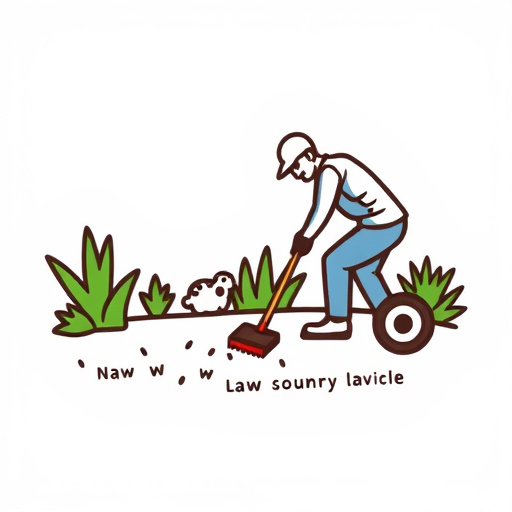Mulch and soil amendments are lawn care and landscaping essentials. Organic mulches conserve moisture, suppress weeds, and act as slow-release fertilizers for plant health. Soil amendments like compost enrich soil structure and nutrient content, fostering robust root systems. Proper mulching techniques during the growing season protect plants from heat/cold, regulate moisture levels, and prevent erosion. Avoiding over-fertilization and inadequate mulching ensures vibrant, healthy gardens with reduced water needs, benefiting both lawn care and landscaping.
“Enhance your garden’s vitality with mulching and soil amendment techniques—essential practices in lawn care and landscaping. This comprehensive guide unravels the benefits of mulch, exploring various types suitable for your lawn. We delve into the crucial role of soil amendments, offering insights on essential nutrients for robust plant growth.
Learn effective mulching techniques, ensuring optimal application and timing. Discover long-term strategies to improve soil health, fostering a thriving ecosystem. Additionally, we highlight common mistakes to avoid, empowering you to master the art of lawn care and landscaping.”
- Understanding Mulch: Benefits and Types for Your Lawn
- Soil Amendments: Essential Nutrients for Plant Growth
- Mulching Techniques: Proper Application and Timing
- Improving Soil Health: Long-Term Strategies for Plants
- Common Mistakes to Avoid in Lawn Care and Landscaping
Understanding Mulch: Benefits and Types for Your Lawn

Mulch plays a vital role in lawn care and landscaping, offering numerous benefits that extend beyond aesthetics. By understanding its advantages and selecting appropriate types, homeowners can enhance their lawn’s health and overall beauty. One of the primary functions of mulch is to conserve moisture in the soil, reducing the frequency of watering needs. This is especially beneficial during hot summer months or for regions with water scarcity issues.
Additionally, organic mulches act as a slow-release fertilizer, providing essential nutrients to the soil over time. They also suppress weeds effectively, preventing their seeds from receiving the sunlight necessary for germination. With regular replenishment, mulch creates a protective layer that improves soil structure, increases aeration, and promotes beneficial microbial activity, all of which contribute to stronger and healthier plants, leading to lush and vibrant lawns.
Soil Amendments: Essential Nutrients for Plant Growth

Soil amendments play a crucial role in enhancing plant health, especially in lawn care and landscaping. These additions provide essential nutrients that enrich the soil, fostering optimal growth conditions for plants. Organic matter, such as compost or well-rotted manure, is a popular choice, offering both immediate and long-term benefits. It improves soil structure, increases water retention, and provides vital nutrients like nitrogen, phosphorus, and potassium, which are indispensable for plant development.
By incorporating these amendments, gardeners can create a healthy soil environment, promoting stronger roots and overall plant vitality. This natural approach to lawn care and landscaping not only enhances the beauty of outdoor spaces but also contributes to sustainable practices, ensuring plants receive the nourishment they need to thrive and creating a lush, vibrant landscape.
Mulching Techniques: Proper Application and Timing

Mulching is a powerful tool in lawn care and landscaping, offering numerous benefits for plant health. When applied correctly, mulch acts as a protective barrier, retaining soil moisture, suppressing weeds, and regulating soil temperature. The ideal time to mulch is during the growing season, when plants are actively absorbing nutrients.
For best results, spread a layer of organic mulch, such as wood chips or straw, around the base of plants, trees, and shrubs, ensuring it’s not touching the stems. This technique not only improves soil structure but also adds essential nutrients as the mulch decomposes over time. Regularly reapply mulch to maintain its depth, especially after rainfall or irrigation, to ensure continuous protection and optimal plant health.
Improving Soil Health: Long-Term Strategies for Plants

Improving soil health is a crucial, long-term strategy for enhancing plant vitality in both lawn care and landscaping. Organic mulching plays a significant role by enriching the soil with essential nutrients and preserving its structure. As organic matter decomposes, it increases soil fertility, promotes beneficial microbial activity, and improves water retention, ensuring plants receive adequate hydration.
Regular application of organic mulch creates a protective layer that suppresses weed growth, reduces soil erosion, and maintains consistent moisture levels. This, in turn, minimizes the need for frequent watering, making it an eco-friendly approach for lawn care and landscaping. By fostering a healthy soil environment, these practices contribute to stronger, more resilient plants capable of resisting pests and diseases.
Common Mistakes to Avoid in Lawn Care and Landscaping

When it comes to lawn care and landscaping, avoiding common mistakes can significantly enhance your garden’s health and longevity. One frequent blunder is over-fertilization, which can burn plants and contaminate local water sources. It’s essential to use fertilizers sparingly and choose those with slow-release formulas for sustained results without damaging the environment.
Another mistake to steer clear of is inadequate mulching. Skipping this step deprives your plants of crucial moisture and temperature regulation. Always apply a layer of organic mulch around your plants, keeping it a few centimeters away from stems to prevent rot. This simple practice can save you time on frequent watering and maintain a lush, vibrant garden.
Incorporating mulch and soil amendments into your lawn care and landscaping routine is a powerful way to enhance plant health and promote robust, vibrant growth. By understanding the benefits of different mulch types and choosing the right soil amendments, you can create an optimal environment for your plants to thrive. Following best practices in mulching techniques ensures these valuable resources stay in place, while long-term strategies for improving soil health lay the foundation for a lush, thriving landscape. Remember, avoiding common mistakes will further contribute to the success of your efforts in lawn care and landscaping.
